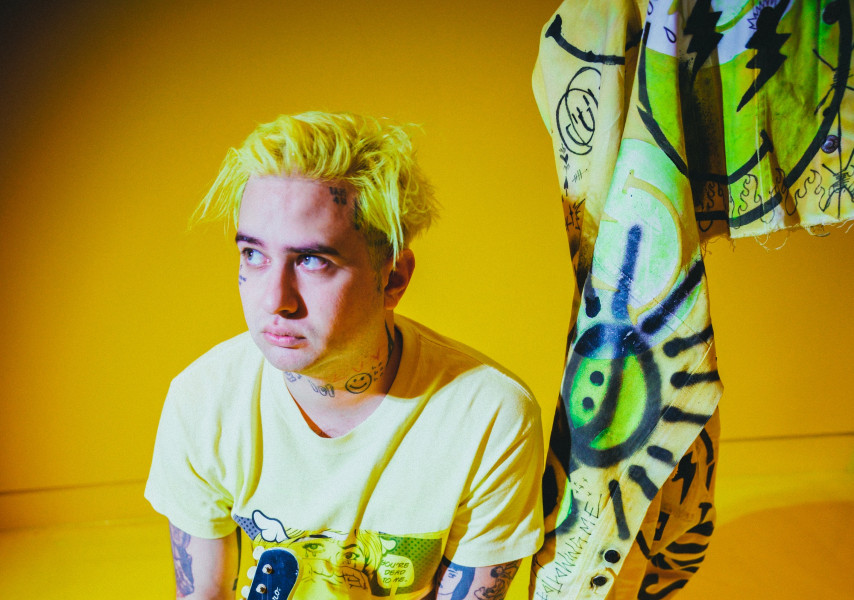Breakout rapper SMILEZ recently dropped the music video, “Coffee Queen,” a track lifted from his latest album, Ur in My World.
After loading up on punk influences and an appreciation for hip-hop storytelling, he found a scene ripe for his sizzle in the mellower yellows of LA’s sand and sun. His debut single, “Head Shoulders,” perfectly resembled his playfully irreverent style while resonating heavily with fans and fellow emcees alike.
Booking a European tour with generational figure 6ix9ine, the two became friends, and SMILEZ became the only independent artist featured amidst rap greats Nicki Minaj, Akon, and more on 6ix9ine’s 2020 album, Tattletales. Since then, he’s shared stages worldwide with the likes of Snoop Dogg, Trippie Redd, Wiz Khalifa, and Juice WRLD.
“Coffee Queen” fuses the rapper’s affinity for punk and hip-hop. With hardcore punk power chords over a trap beat, SMILEZ shouts and ciphers out his longing for control in a nightmare relationship that keeps him painfully crawling back for more.
The video for “Coffee Queen” depicts SMILEZ exiting a phone booth into a desert landscape, the opening shots of the flick embody the emotional distance and scarcity of SMILEZ’s relationship with his coffee queen. Throughout the video, we get clips of his queen, dressed in an equally vibrant orange to his ever-yellow glow—but somehow, she’s always evasive, alone, or dissolving away.
CelebMix spoke with SMILEZ to find out more about the inspiration behind “Coffee Queen,” and the evolution of his sound.
What inspired your new single/music video, “Coffee Queen?”
It’s a song I wrote a few years ago; I just felt like it was a cool energy to have on the album, and the lyrics are more abstract, which I like.
Who directed the video and where was it shot?
I directed the video, and we went out to Joshua Tree for a day and filmed it.
“Coffee Queen” is from your recent album, Ur in My World. Walk us through your mindset as you recorded the album.
I just wanted to make something that was an accurate photograph of my life. Something that I could look back on in five years and be like, ‘That’s exactly what I was going thru at that time.’
How did you get started in music?
I saw Blink 182 play when I was a little kid, and since then my life has revolved around music.
Did your sound evolve naturally, or did you deliberately push it in a certain direction?
Yeah, it was definitely natural. I always go back and forth between the hip-hop and punk-rock world, and with this album, I wanted to make sure that I covered both of those spaces.
How do you keep your sound fresh, and avoid falling into the trap of imitating either yourself or others?
I just have to keep things fun and interesting, otherwise, I won’t end up making music in general, so luckily, that solves itself. That urge to always try to create something that’s never existed before.
How do you keep your sound consistent on stage?
It’s really just about practice and repetition.
Are there any special recording techniques you use in the studio?
I’m pretty simple. I have two guitar amps, so I’ll record a guitar riff, chop it up, add hip-hop production, and then do the vocals. It’s better to keep things simple.
What is your definition of tone? And has your tone changed over time?
Tone is everything. I like to think of it as, like, colors: you want to match the colors so everything looks good together and comes out exciting. Tones, for me, are always changing vocally and musically.
What inspires your writing? Do you draw inspiration from poems, music, or other media?
I’m not that inspired by worldly events; I like to just talk about stuff going on in my personal life, and internally.
What can you share about your writing process?
I write songs all the time; there are no rules.
Which artists in your opinion are killing it right now?
Lil Uzi Vert.
What can your fans look forward to over the next six months? Music videos? Live gigs?
More videos and a new project.

